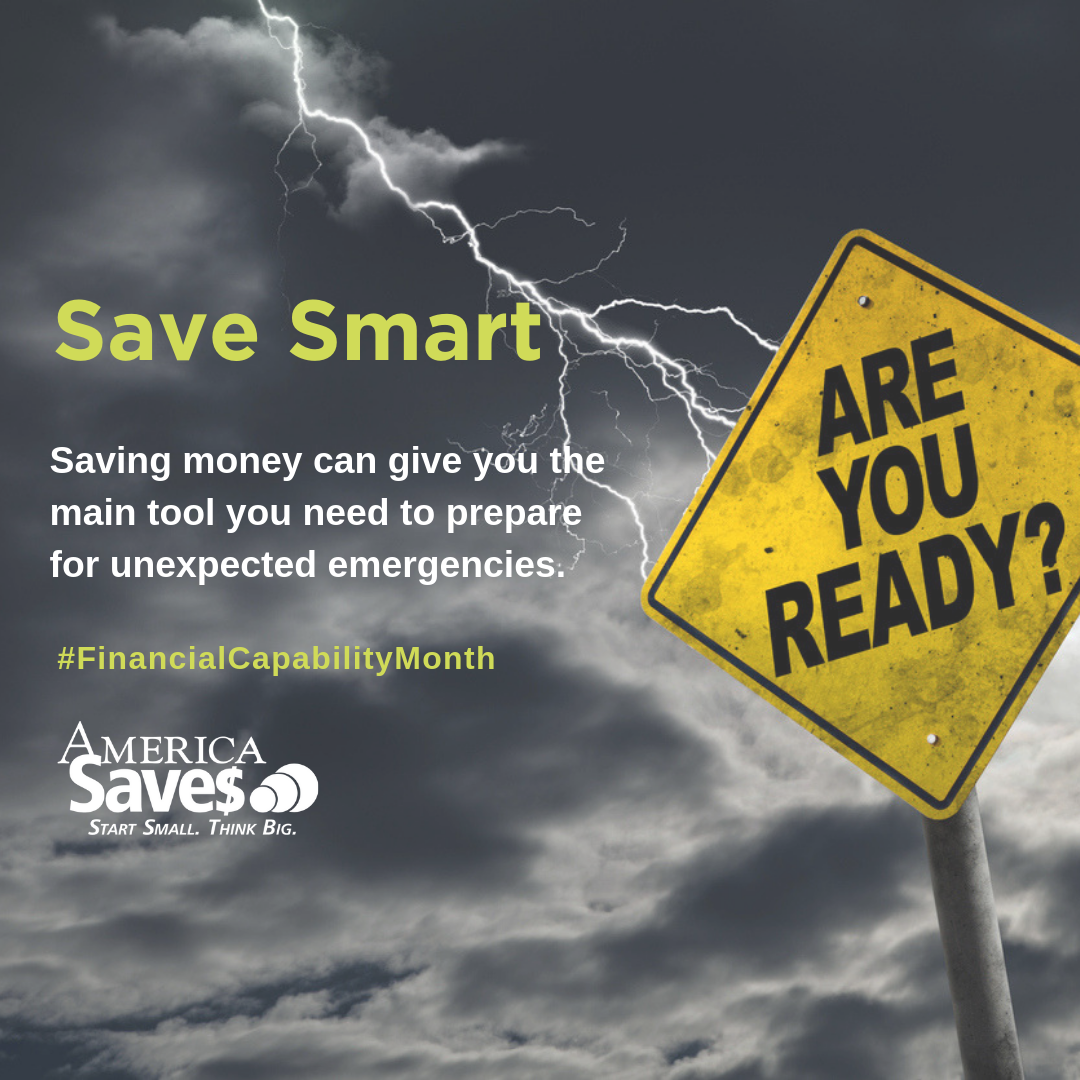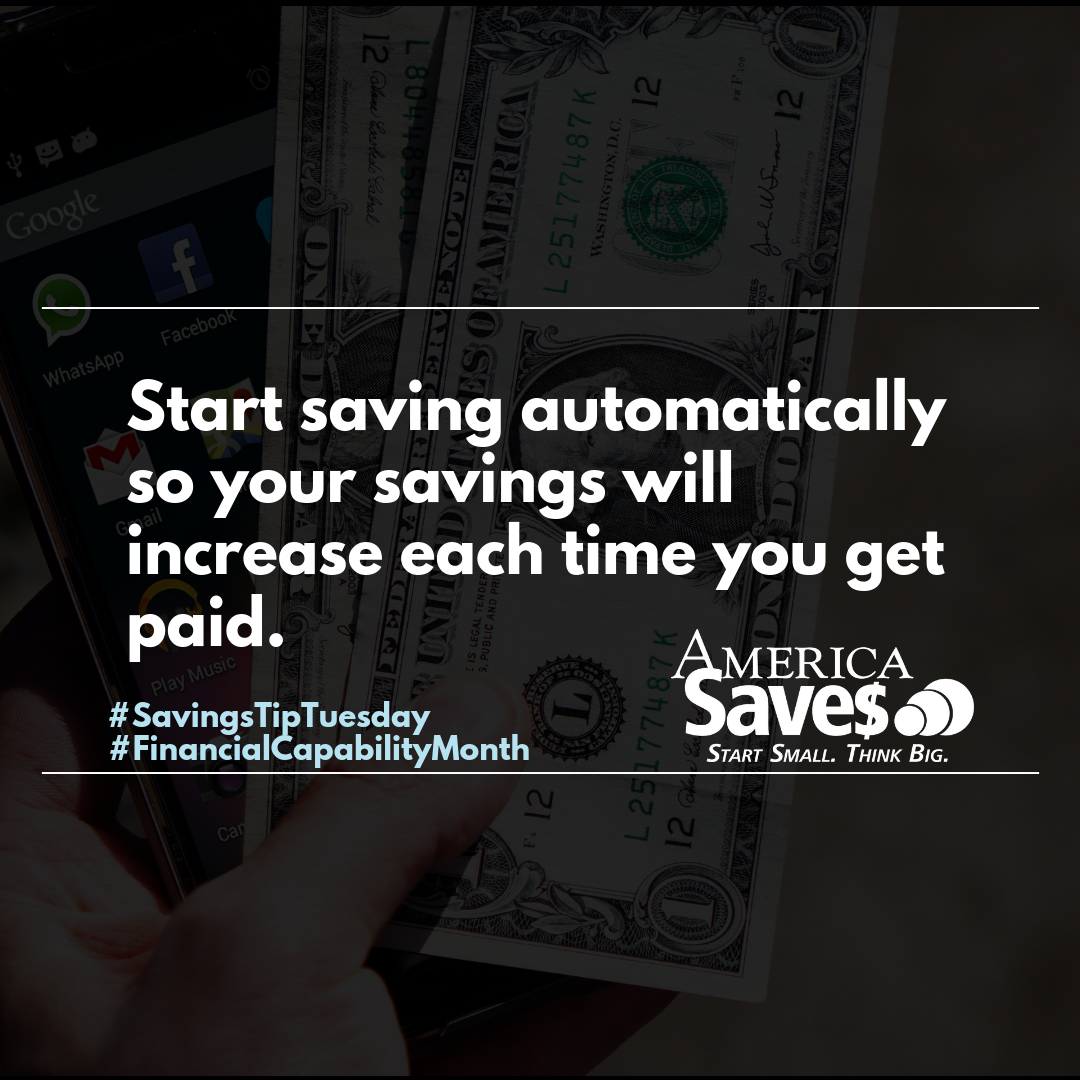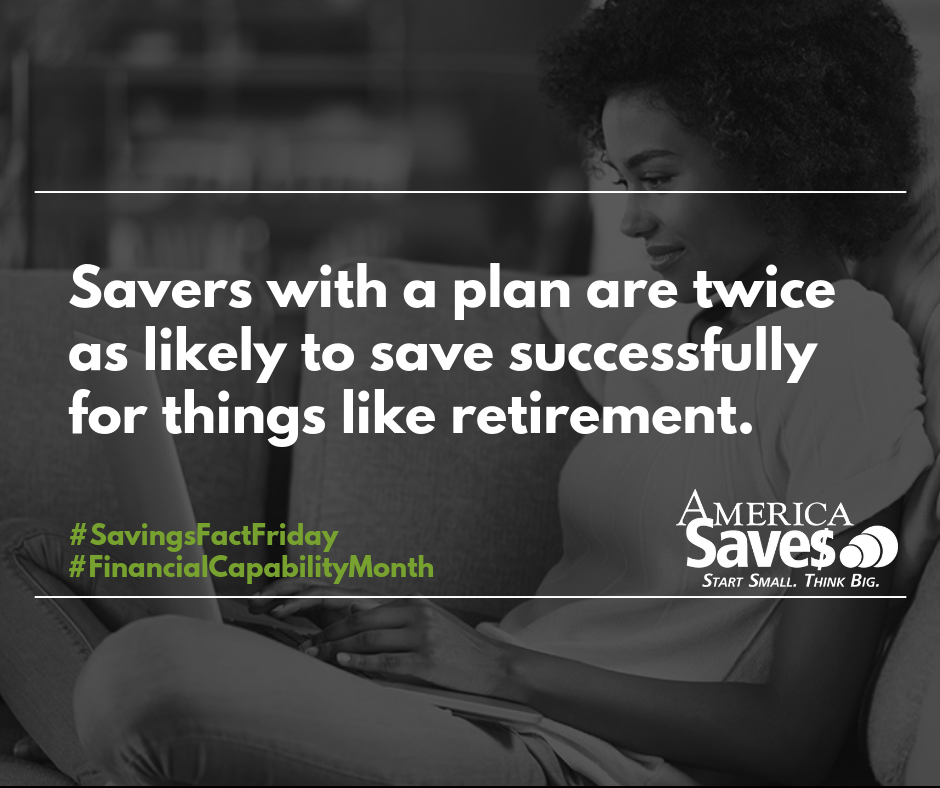Financial Capability Month: Ways to Improve Your Financial Capability Now
Spring is here! This is the perfect time to do some spring cleaning in your financial house. April has been declared as National Financial Capability Month. Throughout the month, the Financial Literacy and Education Commission (FLEC) and the Ready Campaign encourage people to take action to improve their financial futures and to be prepared when disaster strikes.
Spring is here! This is the perfect time to do some spring cleaning in your financial house. April has been declared as National Financial Capability Month. Throughout the month, the Financial Literacy and Education Commission (FLEC) and the Ready Campaign encourage people to take action to improve their financial futures and to be prepared when disaster strikes.
To be a part of the Financial Capability Month conversation, share these blogs, social media content, graphics, and resources with your constituents, partners, and the general public. Encourage others to receive Partner Resource Packets from America Saves in the future by signing up to receive news and updates from America Saves.
Blog Content
For use in communications that directly reach your constituents. We encourage you to use this content as guest posts or rewrite America Saves content as your own.
Are You Ready for National Financial Capability Month? Three Actions to Take Now
By Lila Quintiliani, AFC®, America Saves
April is National Financial Capability Month, when the Financial Literacy and Education Commission (FLEC) and the Ready Campaign encourage people to improve their financial futures and to be prepared when disaster strikes. Here are three actions you can take now to make sure you are ready for any financial disaster, big or small.
Have a Disaster Plan for Your Finances. Sure, you keep bottled water, canned goods, flashlights, and batteries close at hand, but you should also have a disaster plan in place for your finances. The first step is building and maintaining an emergency fund. Then you can make sure the rest of your finances are in order. The Federal Emergency Management Agency (FEMA) has a Financial First Aid Kit that is great for identifying all your important financial information and then helping you keep track of it.
Check Your Financial Well-Being.
Just like you should go see a doctor once a year for a check-up, so too should you assess your financial wellness. The Consumer Financial Protection Bureau (CFPB) has a nifty tool that lets you take a ten question quiz that not only evaluates your financial well-being, but also compares you to other Americans in your age group. Then it suggests ways to improve your score and where to find help.
Make Sure You’re Properly Insured.
Review your insurance coverage. Most homeowners and renters insurance policies do not cover flooding, so you may need to purchase a separate policy from the National Flood Insurance Program. An inch of water in your house can cause $25,000 of damage and 20 percent of flood claims come from areas outside of flood zones. Think because you’re a renter you don’t need insurance? If you don’t have renters insurance, and you lose your personal property to theft or disaster, you will have to replace everything out of pocket.
Let America Saves help you save money. It all starts when you make a commitment to yourself to save. Take the first step today and take the America Saves pledge to save money, reduce debt, and build wealth over time. And it doesn't stop there. America Saves will keep you motivated with information, advice, tips, and reminders to help you reach your goal. Think of us as your own personal support system.
Twelve Successful Ways to Save Money
By Barbara O'Neill, Ph.D., CFP, CRPC, AFC, CHC, CFEd, CFCS, Rutgers Cooperative Extension
Savings is the foundation for investing. You cannot invest money if you have not saved it first. Like dieting, saving money is hard to start, even harder to maintain, and requires patience and discipline. When you achieve your financial goals, however, the results are so worth it. Below are 12 time-tested ways to save:
- Pay Yourself First - Treat savings like an important household bill (e.g., loan payment). Set aside a part of each paycheck, even if it is only a small amount, and leave it there. Save automatically where possible.
- Collect Coins - Put loose change into a can or jar. When the container is full, deposit the money into a savings account. Set aside $1 a day, plus loose change, and you should have about $50 a month, or $600 a year, saved. Save $2 a day, plus loose change, and you should have about $1,000.
- Complete a Savings Challenge - Pick a savings Challenge that matches your time frame and savings goal such as the 30 Day $100 Savings Challenge or the 50 Week $2,500 Savings Challenge. Savings challenges gradually ramp up savings deposits over time and provide motivation and structure.
- Continue to Pay a Loan or Bill - Make payments to savings or investment accounts with money that is freed up when loan payments end or an expense, such as childcare, ends. The rationale behind this savings method is that you are already accustomed to the payment so “redirecting” it will not pinch your cash flow.
- Break Costly Habits - Track your spending for a month or two and pick a few places where spending can be cut back or cut out to “find” money to save. For example, brown bagging lunch two or three days per week could save hundreds of dollars over the course of a year.
- Bank a Windfall - Save all or part of large, infrequent expected or unexpected sums of money. Examples of common financial windfalls include tax refunds, inheritances, settlements, awards and prizes, retroactive pay increases, and year-end bonuses at work.
- Crash Save - Decide that, for a month or two, you will buy only absolute necessities and save any money that remains after paying bills. At the end of the crash savings time period, treat yourself and buy the item(s) that you were saving for. Then resume your “normal” spending habits or set a new crash savings goal.
- Start a “Club” Savings Plan - Start a structured savings plan to save money over the course of a year for holiday or vacation expenses. Some banks and many credit unions still offer them. Unlike “coupon books” of years ago, weekly savings deposits are often transferred electronically from checking to savings.
- Save Your “Extra” Paychecks - Mark your paydays each year on a calendar. If you are paid bi-weekly, in two months of the year, you will receive three paychecks. If you are paid weekly, there will be four months with five paychecks. Anticipate these months in advance and plan to save part of the “extra” paycheck.
- Save Excess Expense Reimbursement Money - Review your employer’s reimbursement policy. If you get a fixed sum for business travel expenses, instead of having to collect receipts, and spend less than the per diem amount, save the difference. Ditto for mileage reimbursement for using a personal car for business.
- Reinvest Interest and Dividends Automatically - Arrange to have dividends and capital gains on mutual funds reinvested to purchase additional shares rather than receiving a check for a small amount and spending it. This is a painless way to increase investment account value over time.
- Participate in a Tax-Deferred Retirement Plan - Reduce your salary via payroll deduction to save for retirement and aim to take maximum advantage of employer matching. Money contributed to a 401(k), 403(b), or similar retirement savings plan and earnings on these funds grow tax-deferred until withdrawal.
For additional information about saving money, visit the America Saves program website.
Believing You Can Improve Your Financial Life
By Amanda Woods, Ohio Saves
When we find ourselves in times of financial hardship, it can overwhelm so many aspects of our life. Maybe you have debt that you’re trying to pay off, or your income has changed and you’re trying to make ends meet. There is no question that these financial situations can cause us stress if we’re unsure how to proceed. We not only become stressed about the future, we also become stressed about how we’ll manage to stay afloat right now. A recent poll conducted by the American Psychological Association (APA) found that stress and anxiety are on the rise among many Americans, and one of the areas found to produce the biggest increase in stress was finances. These feelings can be very isolating and can make it difficult to imagine that there is a way out of this phase of our life or that there is hope for a brighter tomorrow.
I know it can be hard, but it is important to remember that there is always hope – there are always steps that you can take to begin to make the improvements necessary to improve your financial footing.
Understanding where you are. When looking to improve your financial life, a great place to start is knowing your credit score. A recent Consumer Federation of America study highlights the importance of checking your credit score, as well as understanding the factors that go into creating your score. When you have this important piece of information, you’ll be on your way to understanding how to take the necessary steps to improve it!
Another way to gain a better understanding of your current financial situation is to take a look at your budget! Tracking your income and expenses will allow you to get a clearer picture of what money you have coming in and what money you have going out each month. Once you’ve tracked for the month, you’ll be able to figure out your income (the money you receive each month) and your expenses (the money you spent). Once you’ve calculated your income and expenses, you’ll be able to organize this information to help you better understand if there are some areas of your budget that you can adjust to help get you back on track.
Understanding what steps to take. Once you have a better understanding of your current financial situation, you’ll be able to identify some steps to take to help ease your current financial burden. For example, if you’re spending more than you’re making each month, take a look at your expenses and see what changes can be made. Are you able to reduce your expenses? Perhaps there are bills that may not be necessary right now, like movie and music streaming services, that can easily be stopped until you’re once again feeling comfortable enough to add these expenses back in. I know when I’ve hit times of financial strain, one of the ways I reduced my expenses was to stop ordering food in. I was able to drastically cut my expenses because I’d been spending so much throughout the month on takeout and delivery fees, and every little bit helped. It’s important to simply take a look at where your money is going, and to be honest with yourself about the changes that can be made.
If you’re working to pay down debt, another tip would be to work on paying down your higher interest debt first. This higher interest debt will end up costing you more money in the long run in interest fees, so focusing on paying it down first will help you save money while paying off your debt. If this is something that may benefit you, America Saves has some tips for you to begin paying off that higher interest debt.
Another step I’d recommend is to work on building emergency savings! It may seem counter-intuitive when you’re focusing on paying down debt and reducing expenses, but building a little cushion for financial emergencies will have a positive impact on both your stress and financial situation. Having a financial cushion will not only better prepare you for unexpected expenses, it will also prevent you from having to put more debt on a credit card you’re working to pay down. If you’re wondering how you can begin to build an emergency savings, I’d recommend doing so automatically!
Asking for help. Working to improve your financial situation can be overwhelming, and asking for help is an empowering step to take! A great place to start would be reaching out to your local Extension Office! Extension Educators across the state offer financially focused education and outreach that could be exactly what you need to get back on track. Locate your local Extension Office to see what services are offered and to be connected with other helpful resources where available. You may also want to look for other local agencies that offer free financial education, counseling, or planning to help you take control of your financial life. Pursuing financial education will provide you with the knowledge that can help you make the changes necessary for a brighter financial future.
Additionally, if your current financial situation is making you feel stressed or overwhelmed, talking to your friends and loved ones may help! A recent study from the APA highlighted that individuals who were able to reach out to someone for emotional support reported less stress.
Making yourself a priority. Because managing your finances can be a source of stress for many people, it’s important to remember to take care of yourself. If you’re feeling yourself becoming stressed or overwhelmed by everything, take some time to focus on you, making yourself and your health a priority. In fact, Anita Everett, M.D., the President of the APA believes that the recent poll showing increases in financial-related stress highlights a need for people to engage in activities like regular exercise, mindfulness, relaxation, and healthy eating to reduce the impact of stress on ourselves and our families.
No matter what the situation, you can do this! There is always hope to increase your financial security and make the changes necessary to live a financially healthy life. And when things get tough, just know that you’re not alone, and there are people and resources out there to help you through it!
Blog posts in this packet:
Are you ready for National Financial Capability Month? Three Actions to Take Now
By America Saves
Twelve Successful Ways to Save Money
By Rutgers Cooperative Extension
Believing You Can Improve Your Financial Life
By Ohio Saves
Social Media Posts


Monday


Tuesday


Wednesday


Thursday


Friday
Events
Twitter Chat
“Plan for the Unexpected”
Date: Wednesday, April 10
Time: 1:00 pm Eastern
Hosts: The Federal Emergency Management Agency’s (FEMA) Individual and Community Preparedness Division (@Ready.gov) and (@FEMA)
Hashtag: #FinancialChat
This TwitterChat #FinancialChat explores what it means to be financially capable. Participants will learn from experts about how to set financial goals, build a budget, and plan for unexpected events.
Webinar
“Money Matters: Resources for Youth in Financial Preparedness”
Date: Wednesday, April 17
Time: 4:00 pm Eastern
Hosts: The Federal Emergency Management Agency’s (FEMA) Individual and Community Preparedness Division (@Ready.gov) and (@FEMA)
Guest Presenter: Amelia O’Rourke-Owens, Director of Youth Financial Capability, America Saves
This webinar will explore the importance of saving and provide tips on how to encourage saving for youth.
#FinHealthMatters Day
Date: Thursday, April 25
Hosts: Center for Financial Services Innovation (@CFSInnovations)
Mark your calendars and help us once again bring attention to Americans’ financial health through this social media campaign.